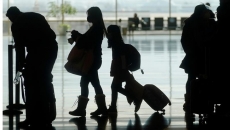A new study that examined thousands of tweets from Canadian public health agencies and officials during the first few months of the COVID-19 pandemic suggests many struggled to tailor messaging to local needs.
The study published online this month in the journal Health & Place analyzed close to 7,000 tweets from public health agencies and officials at all levels of government over the first six months of last year.
Researchers at McMaster University and the University of Waterloo found the tweets initially focused on sharing information from experts, before shifting to promoting health measures such as social distancing.
But they found the messages often failed to reflect the situation and risk level in local communities despite the significant variations in transmission levels and other factors.
"Despite the need for public health communications to effectively convey the level of COVID-19 infection risk in particular jurisdictions, the tweets we analyzed did not always contain relevant messaging or risk communication strategies that would have helped citizens in those jurisdictions assess risks to health," the study said.
Accounts related to urban areas largely used tweets to disseminate information, rather than for other purposes, and the percentage of tweets aimed at promoting specific actions decreased over time, the study found.
"Given that the risks of community transmission of COVID-19 are higher in denser urban areas with larger populations... action tweets could be viewed as a useful communication tool to help drive changes to behaviour among urban individuals to reduce disease spread," it said.
In comparison, accounts related to rural areas -- where transmission was typically lower -- primarily used Twitter to encourage certain actions, though residents may have benefited from more information about the virus, the study found.
While some local agencies tweeted messaging that was relevant to their particular circumstances, those accounts did not have large numbers of followers, drawing fewer per capita than provincial or national accounts, the study found.
"Tweets containing particular messaging deployed at specific times for audiences located in specific places could be better utilized to tackle periods of increased disease transmission during the COVID-19 pandemic and other future public health crises," it said.
"Crafting communications that are relevant for the levels of risk that audience members are likely encountering in a given geographic context could increase the uptake of those communications and result in better population health outcomes."
The study also found only two per cent of tweets examined addressed misinformation and myths surrounding COVID-19.
Tweets debunking COVID-19 myths were issued more frequently by local accounts, a finding the study said was "somewhat surprising" given that provincial and national accounts are primarily responsible for disseminating information about the pandemic.
The study also highlighted a relative lack of "community-building" messages that could have been used to foster institutional trust, calling it "a missed opportunity" to do more than simply share information about the pandemic.
The researchers also cited acknowledging uncertainty and public concerns as a key part of building trust and promoting health measures during a public health crisis.
"It has been critical for public health officials, who are often considered trusted experts, to provide quick and clear information on disease transmission, what constitutes safe and risky behaviour and what community supports are available to slow the spread of the virus," lead author Catherine Slavik, a graduate student of health geography at McMaster University, said in a statement.
"Tweets that focus on community efforts to fight the pandemic ... are really important for building institutional trust, for establishing human connections between the community and local officials who are there to serve them. We were surprised public health officials did not put more emphasis on messages showcasing people coming together or local programs helping to keep us safe."






